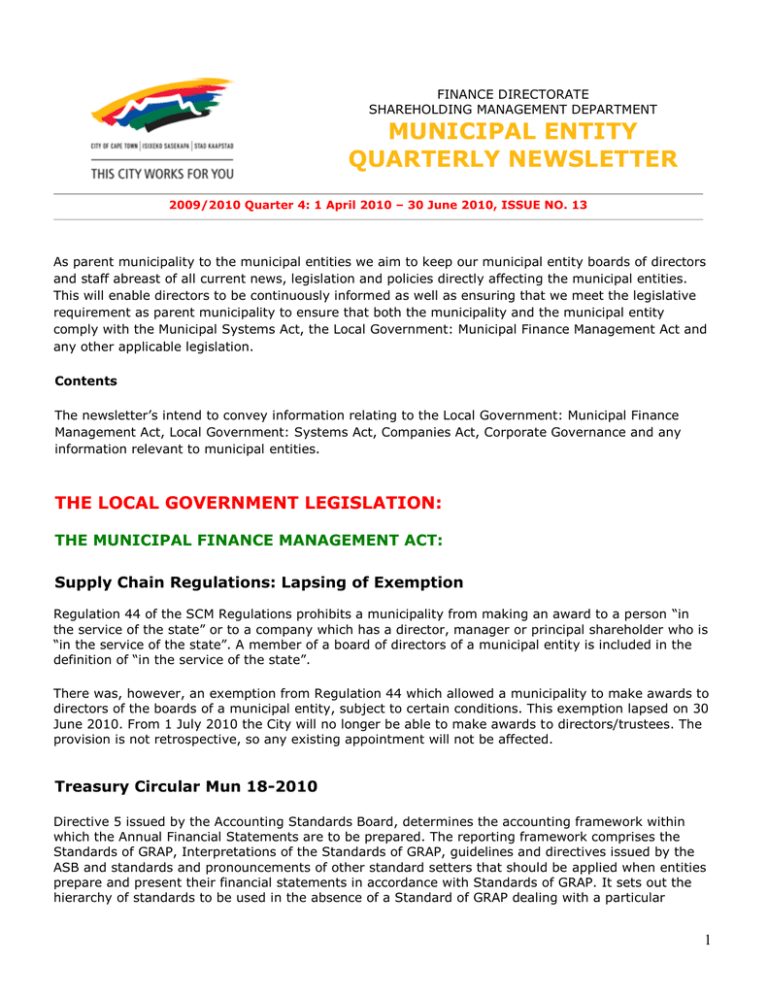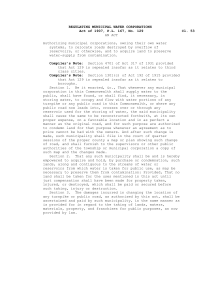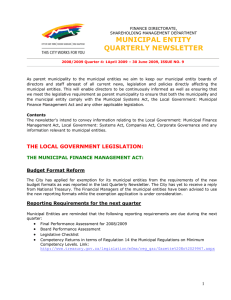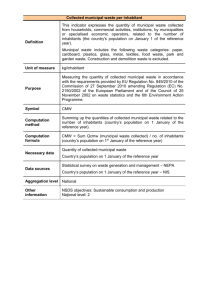
FINANCE DIRECTORATE
SHAREHOLDING MANAGEMENT DEPARTMENT
MUNICIPAL ENTITY
QUARTERLY NEWSLETTER
Analyst
2009/2010 Quarter 4: 1 April 2010 – 30 June 2010, ISSUE NO. 13
As parent municipality to the municipal entities we aim to keep our municipal entity boards of directors
and staff abreast of all current news, legislation and policies directly affecting the municipal entities.
This will enable directors to be continuously informed as well as ensuring that we meet the legislative
requirement as parent municipality to ensure that both the municipality and the municipal entity
comply with the Municipal Systems Act, the Local Government: Municipal Finance Management Act and
any other applicable legislation.
Contents
The newsletter’s intend to convey information relating to the Local Government: Municipal Finance
Management Act, Local Government: Systems Act, Companies Act, Corporate Governance and any
information relevant to municipal entities.
THE LOCAL GOVERNMENT LEGISLATION:
THE MUNICIPAL FINANCE MANAGEMENT ACT:
Supply Chain Regulations: Lapsing of Exemption
Regulation 44 of the SCM Regulations prohibits a municipality from making an award to a person “in
the service of the state” or to a company which has a director, manager or principal shareholder who is
“in the service of the state”. A member of a board of directors of a municipal entity is included in the
definition of “in the service of the state”.
There was, however, an exemption from Regulation 44 which allowed a municipality to make awards to
directors of the boards of a municipal entity, subject to certain conditions. This exemption lapsed on 30
June 2010. From 1 July 2010 the City will no longer be able to make awards to directors/trustees. The
provision is not retrospective, so any existing appointment will not be affected.
Treasury Circular Mun 18-2010
Directive 5 issued by the Accounting Standards Board, determines the accounting framework within
which the Annual Financial Statements are to be prepared. The reporting framework comprises the
Standards of GRAP, Interpretations of the Standards of GRAP, guidelines and directives issued by the
ASB and standards and pronouncements of other standard setters that should be applied when entities
prepare and present their financial statements in accordance with Standards of GRAP. It sets out the
hierarchy of standards to be used in the absence of a Standard of GRAP dealing with a particular
1
transaction or event. The pronouncements of the specified standard setters should be used, in
descending order, to develop an appropriate accounting policy. This only needs to be implemented to
the extent that the requirements are not in conflict with the Standards of GRAP or the Framework for
the Preparation and Presentation of Financial Statements.
NEW LEGISLATION:
CONSUMER PROTECTION ACT, 68 of 2008
The bulk of the Consumer Protection Act (the CPA) will come into force on the 24 October 2010, 18
months after it was signed into law by the President. The CPA will have a profound effect for both
suppliers and consumers alike.
The preamble to the CPA sets out what the Act aims to achieve:
The promotion and protection of the economic interests of consumers
The improvement of access to information that will enable consumers to make informed choices
according to their individual wishes
The protection of consumers from hazards for their well being and safety
The development of effective means of redress for consumers
The promoting of consumer education
The facilitation of the freedom of consumers to associate and form groups to advocate and
promote their common interests, and
The promotion of consumer participation in decision making processes
Broadly speaking the CPA now regulates and codifies the relationship between suppliers and
consumers.
A consumer is defined as a person to whom goods and services are marketed in the ordinary course of
the suppliers business as well as any users of goods and services. It is interesting to note that the
definition of consumer (especially in respect of marketing) also includes potential customers – there
does not have to be an actual transaction.
A supplier is a person who markets and goods or services. The supply of goods includes “sell, rent
exchange and hire” in the ordinary course of business of the supplier. The supply of services includes
the sale, performance or provision of services or granting of access to any premises, event, activity or
facility in the ordinary course of business for consideration.
The CPA sets out what it calls “Fundamental Consumer Rights”.
These rights are:
Right of equality in consumer marketing. This protects the consumer from unfair discrimination
by a supplier and the Equality Court will have exclusive jurisdiction over any alleged unfair
conduct.
Right to privacy. A consumer has the right to restrict unwanted direct marketing.
Right to choose. This right includes the right to select its suppliers, the right to terminate fixed
contracts, the right to a cooling period after direct marketing and the right to return goods.
Right to disclosure of information. This includes the receiving of information in plain and
understandable language and consumers may not be charged a higher price than advertised.
The right to fair, just and reasonable terms and conditions. Examples are the prohibition of one
sided agreements or the unreasonable waiving of rights.
The right to quality and safety. Minimum standards of quality are prescribed.
2
This is not a comprehensive analysis of the CPA. The CPA is a long and detailed piece of legislation
which needs close scrutiny. Municipal entities are advised to study the Act in detail as it will
undoubtedly have an impact on how you conduct your business.
Please contact Louise Muller (021 4003940) or Richard Wootton (021 4002701) if you have any queries
in respect of this newsletter.
Although every effort is made to check the accuracy and quality of the information supplied, The City
cannot be held responsible for any errors that may arise.
Copyright(c) City of Cape Town 2007. All rights reserved. No part of this newsletter may be reproduced or transmitted in any form
without written permission from the City of Cape Town, Finance Directorate, Shareholding Management Department.
3







